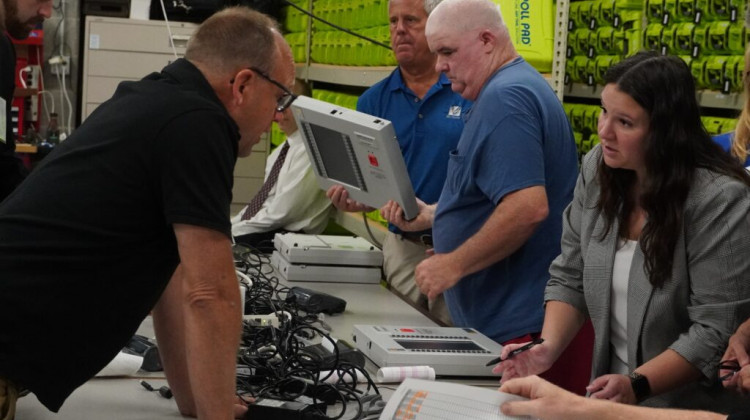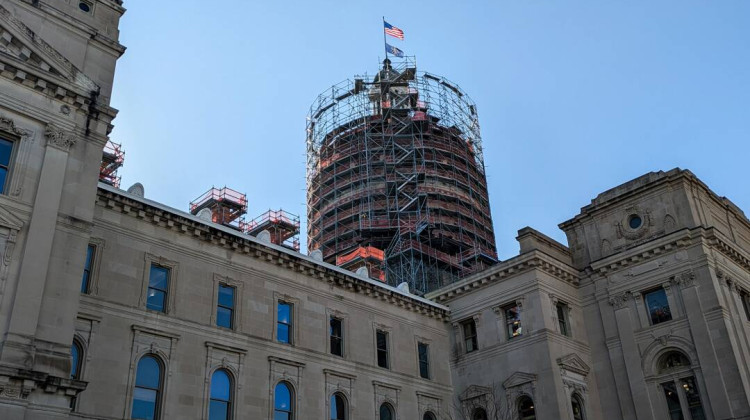
A recount team works on a Republican primary race in Indiana’s House District 32 in the summer of 2022.
Via Indiana Secretary of State’s X accountFor more than two months, Hoosier voters attempting to apply for an absentee ballot online were met with a block of bright red text informing them that the function was down while the state complied with new — and controversial — voter identification requirements.
The service went back online Friday, with just a month and a half before the ballots themselves are due for the November 7 municipal elections.
Although voters could apply by other means, some county election officials — of both major parties — called the outage “concerning” and “inexcusable” for voters. Others said they encountered no problems.
“The Secretary of State has been providing resources and support to complete the application as quickly as possible,” spokeswoman Lindsey Eaton said in a statement to the Capital Chronicle.
“Cutting corners on the development, testing, bipartisan review, and approval,” she added, “is not an option.”
Voter I.D. hits absentee ballot applications
Hoosier voters can only apply for an absentee-by-mail ballot for 11 reasons under Indiana law, in stark contrast to the 27 states that offer “no-excuse” mail-in voting.
(Eight states conduct elections entirely by mail, so voters there don’t have to apply for or request a mail-in ballot — it’s sent automatically.)
But in Indiana, the birthplace of the voter I.D. movement, lawmakers have expanded verification requirements.
House Enrolled Act 1134, which became law in May, requires voters to submit at least one of a variety of identification numbers to apply for a ballot: the last four numbers of a social security number, an Indiana driver’s license number, a non-driver identification card number or a unique identifier for those who registered to vote decades ago.
A voter could instead include a photocopy of their license, non-driver card or other proof of identification — like a passport or state university-issued ID card — in the envelope with the application.
The catch? The information must match what’s on file — a potential challenge for Hoosiers who signed up to vote long ago. Without a match, election officials must work with the voter to resolve the errors, delaying receipt of the ballot.
During the legislative session, voting rights advocates called the legislation “unnecessary” and said it could disenfranchise some, while the bill’s Republican author and supporters said it would bring mail-in voting security “up to par” with in-person voting.
When the law went into effect in July, Republican Secretary of State Diego Morales’ office had an updated paper form readily available. Voters could mail, email, fax or hand-deliver their applications to their county election officials.
But that month, online submission went dark.

‘Nothing in my hopper’
The online submission option, which has been available since 2020, automatically delivers a populated PDF form to an official’s queue.
And its sudden absence prompted alarm for some.
“This is something that the voters have come to rely on,” Elkhart County Clerk Christopher Anderson, a Republican, told the Capital Chronicle. “It is a way for those voters, who want to vote by mail, of getting their application to us in an extremely timely basis — because it’s almost instantaneous.”
Anderson hadn’t known the option was unavailable. He logged into IndianaVoters.com, muttering while he keyed in his information.
“Really?” Anderson asked, after reading the red text of the notice. “Yeah, this is kind of — yeah, it is a little concerning.”
“Maybe that’s why I have nothing in my hopper,” he said. “I did not know that it was down. I was beginning to wonder.”
The Indiana Secretary of State’s Office said its bipartisan technical committee, which administers the online absentee voting applications, took the function down in July “in response to requests from County Clerks.”
“Processes to allow counties to verify ID information provided by applicants needed to be designed, built, tested, and approved,” the office’s Eaton said.
“Overall, the state-wide voter registration system, network and security features involved, is quite complex,” she continued. “The bipartisan team, (information technology) contractors, and web hosting resources required considerable time to schedule the design, review, building, testing and approval steps.”
She said they’d been “working diligently” to implement the law’s requirements since its passage, and had even had to rearrange resources and schedules for other planned work to get the changes done.
Some still weren’t happy.

Outage means more work for some
For Marion County election officials, online submission was the go-to workaround for other problems — until it was taken down.
The county is Indiana’s most populous, with — by far — the state’s largest number of active voters, according to 2022 general election turnout data.
Marion County Election Board Deputy Director Patrick Becker, said the county was struggling to match voter information against a database the county uses, so it directed voters to apply online instead.
“The database has inaccuracies,” Becker said. “… We were telling people to use the online application process because it validates your driver’s license number. … And then, with no warning, the state just shut that off.”
“The state was aware of (the updates) when the law was passed. They knew they had to build a tool,” Becker added. “They knew they had to open new forms, and they’re rolling this change out the day that counties have to send ballots out for the first time.”

Under state law, county election officials must mail out a first batch of ballots — in answer to the applications received since after the May primary election — by September 23. Since it’s a Saturday, most consider Friday the functional deadline.
For applications submitted between Sunday and October 26, counties send out the corresponding ballots daily, on a rolling basis.
Marion County Clerk Kate Sweeney Bell, a Democrat, said the outage had forced her office to expend more time and resources helping voters through paper applications.
She said workers had been “taking a lot of telephone calls” and looking up voters’ information because people didn’t remember what identifying number they’d used to register to vote. Becker added that it had been challenging to explain to confused voters why applications submitted months ago needed fixes.
“To take almost the entirety of the functionality of IndianaVoters.com offline has been very, very frustrating for us,” Sweeney Bell said. “But for voters who — that’s what they have gotten used to, and that’s what they know — it’s inexcusable.”
But for other counties, the outage presented little issue.
‘I haven’t had one phone call’
Several counties reached by the Capital Chronicle said they’d been conducting business as usual despite the temporary take-down.
Madison County Election Deputy Heather Bailey said more voters had applied by mail as opposed to online over the last four election cycles.
“I don’t think it being down has been a major conflict,” Bailey said. “We have hundreds of applications that we’ve already received.”
“To be honest, I haven’t had one phone call about it,” she added.
While her team hadn’t requested the outage (“not to my knowledge”), and she couldn’t recall being notified back in July, she’d received notice of when the service was expected to go back online.

Putnam County Election Deputy Stacia Hathaway said her team had received communications from the state “all along the way” as the technical committee and its support staff labored to make the required changes.
But, she said, “As far as the voters, I haven’t heard anything.”
Allen County Elections Director Amy Scrogham said the effects had been manageable.
“(How) it impacts us is: people, they try to do it online and they can’t, so they call instead — but this is a city election,” Scrogham said. “So it’s not where we’re getting 1,000 phone calls a day. It’s a little slower. And it’s still pretty early in the game.”
Still, she said, over half of applicants typically opt for the online route.
She’d known about the outage “the whole time.”
“They were doing some updates because (of) the statute change where you have to provide that information,” Scrogham said. “So we (clerks) made a comment to them that, well, it’s letting it go through without that. So they stopped it and they were trying to fix it.”
The service was available once more beginning Friday, more than two months after it was taken down.

Any impact?
Hoosier voters who wish to cast a ballot by mail must get their applications in the hands of election officials by October 26, according to Indiana’s election calendar.
And officials must have received their completed ballots by November 6 at noon for their vote to be counted. There are just 6 weeks until then.
Secretary of State Morales’ office said it didn’t expect the outage to impact voter turnout.
“Because of the efficiency of the online absentee voting application process, the Secretary does not anticipate that this week’s go live date for the online application will inconvenience or adversely impact voter participation in the upcoming November Municipal Election,” Eaton said.
Some opponents of the changes said the timing wasn’t appropriate.
“This … lack of access to the absentee ballot portal proves once again that we should not be making major election law changes during an election year,” said Rep. Tonya Pfaff, a Democrat representing the Terre Haute area. “As elected officials, we should be making it easier for elderly and homebound Hoosiers to vote – not making this constitutional right more difficult to exercise.”
Pfaff, the ranking minority member of the House’s elections committee, spoke against the I.D. proposal during the legislative session.
Others said they’d do some more waiting and seeing.
Asked about the utility of the changes, Madison County’s Bailey said she hadn’t yet formed an opinion.
“It’s kind of too early to tell,” she said. “(But) it is nice to have the extra verification there.”
Senior Reporter Whitney Downard contributed reporting.
 DONATE
DONATE






 Support WFYI. We can't do it without you.
Support WFYI. We can't do it without you.